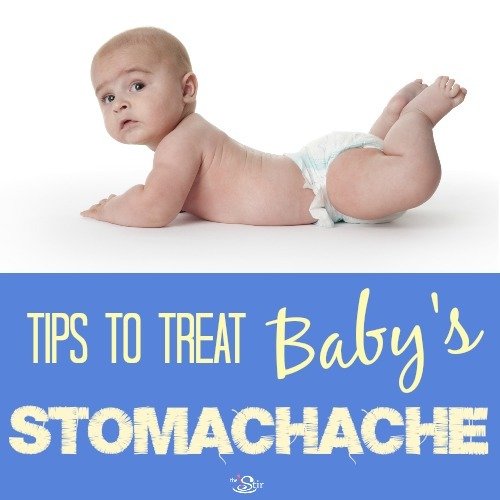Every mom knows there are a bevy of reasons her little one might be crying — from hunger to teething or tiredness. But just like grown-ups, babies may get fussy thanks to an annoying, uncomfortable ailment: the all-too-prevalent stomachache. "Breastfeeding mothers will want to see if there is something they are eating in their diet that could be upsetting the baby," says pediatrician and certified lactation educator Christine Wood, M.D. "Common things can include milk and dairy products, and spicy foods." However, gastrointestinal upset may also occur as the result of anotherwellness woe, such as colic or indigestion.
Here, 5 causes of babies' upset tummies and the best tricks for addressing each.
Tummy Trouble #1: Colic
Although the jury is still out on the exact cause of colic — defined as uncontrollable, excessive crying in babies under 5 months — recent research asserts that babies with colic also happen to develop a certain intestinal bacteria later than babies who don't have colic. And the lack of proteobacteria and probiotics leads to stomach pains, which triggers the crying. Poor baby!
What you can do: You may want to consider asking your pediatrician about a probiotic (Lactobacillus reuteri in particular) supplement, which could help reduce symptoms. "In the meantime, parents can try swaddling, swinging, playing soothing music, or other similar relaxing techniques," advises pedatrician Kevin Polsley, M.D., Loyola University Health System in Illinois. "However, changing from one formula to another is generally not recommended."
Tummy Trouble #2: Constipation
Although infants, especially breast-fed infants, can go a couple of days without a bowel movement and still not be considered constipated, many babies are affected by and suffer stomachaches if they're having difficulty passing stool. A general rule of thumb from the American Academy of Pediatrics (AAP): If you suspect constipation in a newborn, one tip-off is firm stools less than once a day. But no matter what age your little one is, if their stools are hard, dry, and painful to pass, they may be constipated.
What you can do: "Parents need to monitor babies' bowel movements, because one of the worst things that can happen is that a little constipation problem turns into a much bigger one," says Matthew Levy, D.O., emergency physician and assistant professor of emergency medicine at Johns Hopkins Hospital in Maryland. "You want to avoid them being impacted with stool, because that can be especially uncomfortable." As for treatment, Dr. Levy suggests speaking to your pediatrician about using a fiber supplement to your baby's formula or an over-the-counter laxative (like Miralax).
Tummy Trouble #3: Acid reflux
Most babies spit up, or even throw up on occasion, after feedings. But if your baby seems to be suffering from a stomachache and seems to be spitting up or vomiting often, she may be suffering from gastroesophageal reflux, also referred to as "reflux." This occurs when the valve between the baby's esophagus and stomach doesn't work properly, and food and gastric acid come up from the stomach into the throat. The upshot is often an upset stomach and burning sensation in the chest and throat. Ouch.
What you can do: Usually your pediatrician can diagnosis reflux by discussing your baby's medical history. A few lifestyle measures can be taken to speed relief, such as elevating the head of the baby's crib or bassinet, holding your baby upright for 30 minutes after a feeding, or thickening bottle feedings with cereal (which you'll want the doctor's go-ahead for). Thankfully, most babies outgrow their reflux symptoms by the time they're 12 months old. "If the reflux is causing severe symptoms, or if there is poor weight gain, a medication may be necessary," says Dr. Polsley.
More from CafeMom: 6 Natural Ways to Treat Infant Gas
Tummy Trouble #4: Gas pain
In their first three months of life, infants are especially susceptible to gas pain, as their intestines are still maturing, making digestion far from a piece of cake! Then, from 6 to 12 months, they may also have trouble as a result of trying different foods. Either way, gas pain is no fun for mama or baby.
What you can do: The good news is that there are many natural measures you can take to help get things moving and offer relief for your baby. If you're feeding from a bottle, you could try using an "anti-gas" bottle, like Dr. Brown's Natural Flow. It also helps for your baby to always be on an incline when eating, with her mouth above her belly. You might also consider Mommy's Bliss Gripe Water, a combination of herbs and other natural ingredients, is a go-to recipe to quash gas.
Tummy Trouble #5: Stomach flu
While we tend to think of wintertime as flu season, babies may fall sick with the flu or gastroenteritis anytime of the year. In fact, it's the second most common illness in the U.S. after the common cold. Tell-tale signs include vomiting and suffering from diarrhea, as well as a fever, loss of appetite, and in turn, dehydration.
What you can do: If you think your child may be fighting the flu or is at risk of getting dehydrated, reaching out to your pediatrician ASAP is best. In the meantime, ensuring he is getting enough fluid (either breast milk or formula) is imperative.
It's important to bear in mind that certain red flags may mean your baby's stomachache requires more immediate attention. Dr. Levy notes, "Warning signs for something more serious include any behavior out of the ordinary, including inconsolable crying not alleviated by normal activities that typically soothe your child, poor feeding, persistent vomiting, vomiting green liquid (which can indicate a bowel obstruction), baby acting not as alert as usual, decrease in number of wet diapers (which may signal dehydration), fever, or bloody stool or vomit, which is an automatic sign to go to the ER."
What has been the culprit of your baby's stomachaches more often than not? What did you do for relief?

*Bottom image via iStock.com/PicturePartners *




